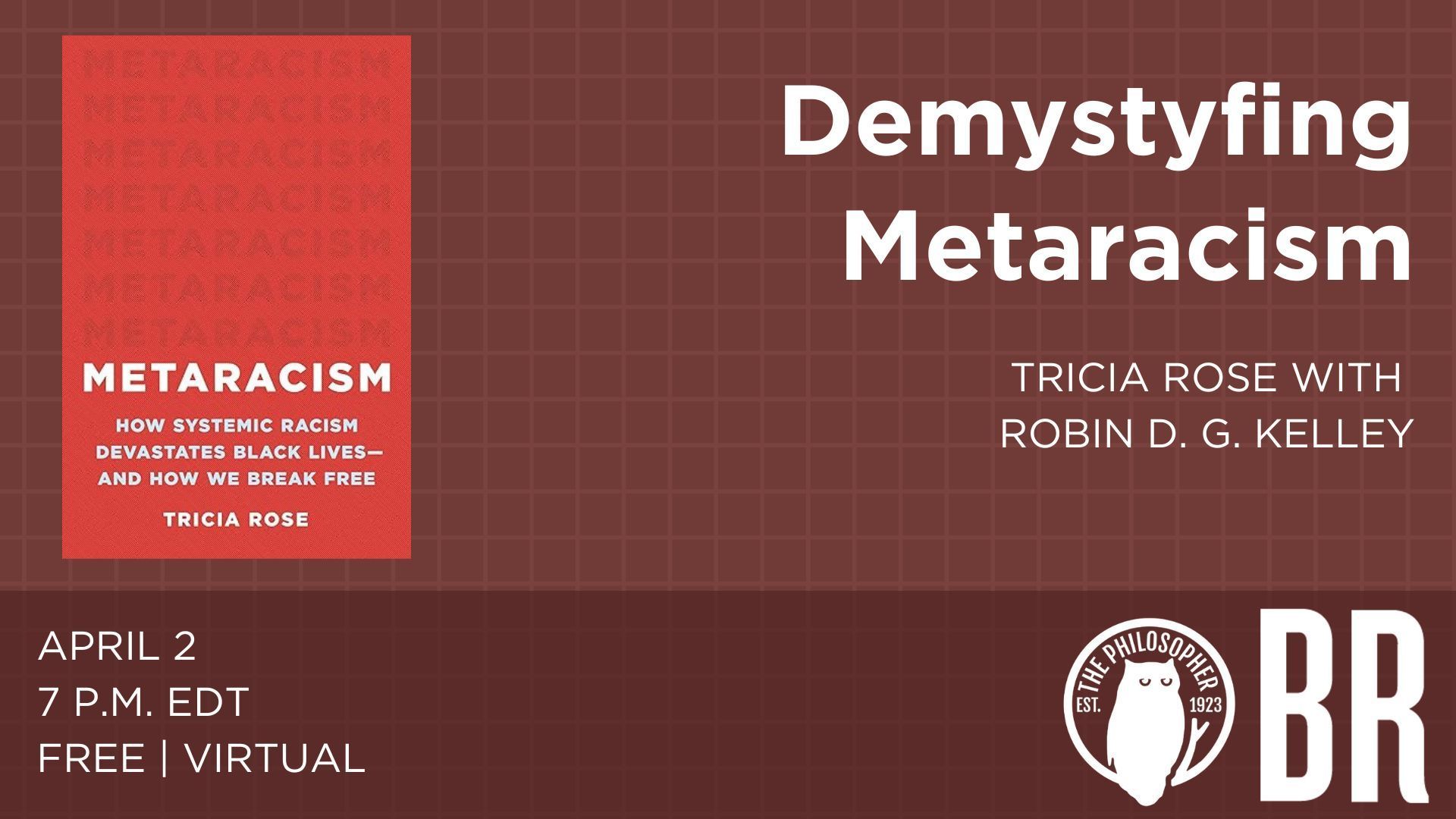Demystifying Metaracism: Tricia Rose with Robin D. G. Kelley
April 5, 2024
VIDEO:
Discourse that allows us to express a wide range of ideas, opinions, and analysis that can be used as an opportunity to critically examine and observe what our experience means to us beyond the given social/cultural contexts and norms that are provided us.
Demystifying Metaracism: Tricia Rose with Robin D. G. Kelley
April 5, 2024
VIDEO:


Robin D.G. Kelley: Third Rail Lecture Series
March 20, 2024

Join us today, April 2, 2024 for a free, virtual event with @ProfTriciaRose and Robin D. G. Kelley discussing Metaracism: How Systemic Racism Devastates Black Lives—And How We Break Free.
Learn more and register:
https://secure.givelively.org/event/boston-c...
https://secure.givelively.org/event/boston-critic-inc/demystifying-metaracism
Demystifying Metaracism
Tue, April 2nd 2024 at 7:00 PM EDT · By Boston Review
Date & Time:
Tue, April 2nd 2024 at 7:00 PM EDT
Virtual Location
Link will be included in email receipt
Event Details
Tricia Rose discusses Metaracism: How Systemic Racism Devastates Black Lives—And How We Break Free with Boston Review contributing editor and historian Robin D. G. Kelley. Co-hosted with The Philosopher.
In recent years, condemnations of racism in America have echoed from the streets to corporate boardrooms. At the same time, politicians and commentators fiercely debate racism’s very existence. And so, our conversations about racial inequalities remain muddled.
In Metaracism, pioneering scholar Tricia Rose cuts through the noise with a bracing and invaluable new account of what systemic racism actually is, how it works, and how we can fight back. She reveals how—from housing to education to criminal justice—an array of policies and practices connect and interact to produce an even more devastating “metaracism” far worse than the sum of its parts. While these systemic connections can be difficult to see—and are often portrayed as “color-blind”—again and again they function to disproportionately contain, exploit, and punish Black people.By helping us to comprehend systemic racism’s inner workings and destructive impacts, Metaracism shows us also how to break free—and how to create a more just America for us all.
ABOUT THE PANELISTS:
Tricia Rose is Chancellor’s Professor of Africana Studies and director of the Center for the Study of Race and Ethnicity in America at Brown University. She is author of three books, including the award-winning scholarly analysis of hip hop and its sequel, The Hip Hop Wars.
Robin D. G. Kelley is Gary B. Nash Professor of American History at UCLA, a contributing editor at Boston Review, and the author of many books, including Freedom Dreams: The Black Radical Imagination and Hammer and Hoe: Alabama Communists During the Great Depression.
https://secure.givelively.org/event/boston-c...
Event sponsored by BOSTON REVIEW:
Boston Review
@BostonReview
A political and literary forum, independent and nonprofit since 1975.
NEWSLETTER: https://bit.ly/3vm6DFb
MEMBERSHIP: https://bit.ly/3NT3ByF
Cambridge, MAbostonreview.net
Tickets to this event are
free and open to the public. Please consider making a small contribution
of $10—or any amount you can donate—when you register to help fund
future events like this and the work of Boston Review. Event registrants
will be added to our email newsletter list.
Need help? Email support@givelively.org
Tricia Rose — Metaracism: How Systemic Racism Devastates Black Lives - with Rashad Robinson
Rose's first book, Black Noise: Rap Music and Black Culture in Contemporary America published by Wesleyan University Press in 1994, emerged from her groundbreaking doctoral dissertation at Brown on hip hop, sparked national academic recognition of this subculture's legacy. The Village Voice placed it among the top 25 books of 1994, and the Before Columbus Foundation, and in 1995, gave it an American Book Award. Rose is also the first person in the United States to write a doctoral dissertation on hip hop.
 / proftriciarose
/ proftriciarose  / triciarose18
/ triciarose18  / tricia-rose-478bb3a8
/ tricia-rose-478bb3a8 Metaracism: How Systemic Racism Devastates Black Lives―and How We Break Free
by Tricia Rose
Basic Books, 2024
[Publication date: March 5, 2024]